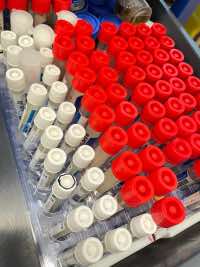
Watch this Article in Video Format
Free screening for Sexual Diseases
The European Diagnostic Week
The European Test Week for the early diagnosis of sexually transmitted diseases has started. From 15 to 22 May, Europe is acting to increase the offer of STD Swab tests aimed at the early diagnosis of HIV, viral hepatitis and other Sexually Transmitted Infections (STI).
THE ADVANTAGES OF EARLY DIAGNOSIS
Actively pushing the spread of testing for STDs and achieving an early diagnosis brings countless advantages. Knowing your condition is essential to facilitate rapid access to treatment. Keep your health, and prevent these infections from being unknowingly transmitted. In the case of HIV, antiretroviral therapies (ART) can safeguard people’s lives and health by avoiding the progression to AIDS. Furthermore, the therapies quickly suppress the viral load, making the virus non-transmissible sexually. If you are not aware of having contracted it on the contrary, the opportunities for transmission significantly increase.
Inaugurated in 2013, Diagnostic Week is held in spring and autumn, involving around fifty countries in the WHO European Region. Over the years, it has involved up to 740 organisations: NGOs, administrations, public and private social and health services, giving rise to one of the most important international mobilisations for public health. Italy is at the forefront.
This year, too. The LILA (Italian League for the Fight against AIDS) has joined the initiative to strengthen the offer of anonymous and free rapid checks, HCV and syphilis that can be carried out in eight Italian cities (Bari, Cagliari, Como, Florence, Livorno, Milan, Turin and Trento, for a total of seventeen dates and fifty hours of voluntary commitment. In some locations, collecting free self kits will also be possible to promote this early diagnosis opportunity.
BARRIERS TO HEALTHCARE
To reach people who would not turn to traditional structures, sometimes burdened by too many barriers—requests for documents or prescriptions, minor age, inflexible hours—the offer of HIV tests by NGOs and communities in non-healthcare contexts becomes key. In addition to STD Urine PCR services at offices, territories, and meeting places, LILA has also provided a remote support service for those who want to purchase a self-kit available in pharmacies and do it in their own home or another private place for some years.
IN EUROPE
The available numbers on STIs support the importance of STI Urine exams in reaching early diagnoses. The latest estimate provided by EuroTEST is that approximately two million three hundred thousand people have HIV. And these live in the WHO European region. Among these, one in five does not know they have contracted an STI. Such a large segment of them is underground. The main source of new cases of infection. This is due to wider unawareness linked to poor prevention work and incorrect risk perceptions. Late diagnoses also represent another serious risk of the poor use of exams. In Europe, over half of new STD Panel diagnoses occur when people already have AIDS or are close to having it. This percentage reaches over 63% in Italy, and given the option of great therapeutic opportunities, this is a difficult event to exist.
THE STRATEGY AGAINST AIDS
The Diagnostic week adds significantly to the path to achieving the UN sustainable development goals (SDGs). The end of AIDS as a threat to public health by 2030 after the loss of use of HIV blood tests following the COVID pandemic. So, making up for lost time is now more urgent than ever. To align with this objective, the UN and UNAIDS (the United Nations AIDS Programme) show small wins and targets. Among these is “95-95-95,” done by 2025.
Member States must commit to making at least 95% of people aware of their serological status. Also, guarantees access to treatment for this 95% and ensures that 95% of all people on ART achieve virological suppression. Therefore, a condition of non-infectivity.
Italy is currently in line with the second and third “95.” It is connected precisely to HIV Lab exam promotion and the emergence of the underground economy.
HEPATITIS C IN EUROPE.
The same goes for viral hepatitis, which causes serious liver diseases. Hepatitis C (HCV), according to estimates provided by EuroT, affects around fourteen million Europeans. But with a diagnosis rate that does not exceed 4.6%. Most of those affected do not have access to the treatments that would allow a total recovery. Also largely missed is hepatitis B (HBV), which, according to the same estimates, affects fifteen million people in Europe. Existing treatments make it possible to live with this infection as best as possible, which is also fought with a vaccine.
A POSITIVE EXAMPLE
There is good Urine exam news for Italy: to rid us of and get rid of the hepatitis C virus (HCV). Funding of over 71.5 million euros has been used to carry out free screening of the HCV virus. As established by the decLaw Law 162 of 30 December 2019. The screening is intended for those born between 1969 and 1989 and those most at risk. They are drug addicts and prisoners. Approximately 5 people out of 1000 who take the exam are checking positive for the hepatitis C virus.
These people have been found to carry out further checks and treatments voluntarily. And these are highly effective and practically free of side effects. The screening application is an important resource that should be used to the fullest to allow Italy to move towards ridding us of HCV.

